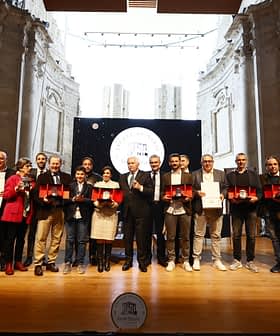World Olive Oil Consumption Hasn't Risen Since 2003, Even With 1B More People
Countless studies have proved the health benefits of olive oil. Why are we consuming less today than we did 14 years ago?
You can say what you want about the proven health benefits of olive oil. How it’s the cornerstone of the famous Mediterranean diet. How countless studies over the past decade have shown it helps combat cancer, Alzheimer’s, diabetes, cardiovascular disease. People who eat olive oil even have larger brains. They tend to be happier.
Yet even with the health benefits of olive oil firmly established and with more high-quality olive oils available to us now than ever before, humans choose less-healthy seed oils 97 percent of the time.
Olive oil consumption hasn’t budged in 14 years. This according to the International Olive Council (IOC) whose job is to promote its consumption worldwide. Even with nearly 1.2 billion more mouths to feed, we’re eating less olive oil now than we did in 2003 — when they still made Volkswagen Beetles.
In 2003, the worldwide per capita annual consumption of olive oil was 452 ml. Today, it’s around 391 ml. That doesn’t say much for the size of our brains.
And we can’t blame this one on social media. In fact, Instagram is ablaze with food porn featuring streaks of green gold which we flip through as we reach for that big yellow bottle of Canola or corn oil. (By ‘we’ I mean you.)
Celebrity chefs have been out-hyperbolizing each other into a frenzy — one even coined the term ‘EVOO’ (then promptly proved she knew almost nothing about it).
And yet here we all are, eating on average about 2/10 of a teaspoon a day of olive oil (even with the help of our Greek friends). We eat at least 30 times as much rapeseed oil.
The IOC declined a request for comments on the return of olive oil consumption to Nokia-phone-era levels. The intergovernmental organization has been strapped for cash ever since the European Commission, under pressure from the seed oil lobby, pulled much of the IOC’s funding, according to Fausto Luchetti who ran the IOC from 1987 until 2002.
Luchetti, who was recently cleared, after 15 years, of charges of financial improprieties stemming from his tenure in Madrid, led the IOC during its heyday when olive oil consumption nearly doubled. It’s been flat ever since.
© Olive Oil Times | Data source: International Olive Council
“When I took office in 1987, olive oil consumption in the U.S. reached 25,000 tons, half of which were esterified oils,” Luchetti told Olive Oil Times. “I realized that the first thing we had to do was to improve quality. If we wanted consumption to increase, we needed a product that really corresponded to what we said about extra virgin olive oil with its nutritional properties, organoleptic and biological values, and so on.”
“Until the mid-80s the typical American consumer of olive oil was still the immigrant from the Mediterranean area, especially Italian, who did not pay attention to quality and consumed a product that had very little to do with extra virgin olive oil,” Luchetti added. “For years, consumption was subject to stagnation, around 15 – 20,000 tons, because consumers were those poor people unable to afford high costs for fats in their diet.”
Luchetti set out to improve product quality while the group engaged researchers. “We created a network of researchers who studied the properties of extra virgin olive oil and led to results which have been widely accepted.”
“Basically, since the mid-80s until the early 1990s, we tried to sensitize potential consumers, especially Americans, through the dissemination of scientific knowledge,” Luchetti recalled. “We finally started to reap the rewards of our work with the International Conference on the Mediterranean Diet at the Harvard School of Public Health, in 1993, which definitively popularized the properties of extra virgin olive oil.”
“Today, the IOC no longer does scientific research, and, in this sense, I would like to stress the Organization’s attitude that (promoting scientific research) is no longer necessary since (they believe) what has already been done was sufficient,” Luchetti said.
The IOC might be right about that. Studies on the health benefits of extra virgin olive oil — and the Mediterranean diet — have piled on top of one another since Luchetti’s tenure at the Council, with or without the group’s funding.
It might be right to assume that the healthfulness of extra virgin olive oil is common knowledge by now. Unfortunately, just as pervasive is the confusion. Consumers are suspicious of olive oil quality and most are unable to determine whether the oil they are buying is authentic or not.
People know extra virgin olive oil is healthy. They also watched the 60 Minutes segment on Mafia’s role in Italian agribusiness with images of police trained in olive oil tasting. They read the now infamous New York Times infographic — the one that no writer would admit to penning — that contained so many inaccuracies, the Times redacted much of it, albeit long after the damage had been done.
And they heard about the bombshell UC Davis study, financed by California olive oil producers, that called out imported olive oils as frauds (though some domestic ones were too), issuing a 2010 report that has been twisted, distorted and overblown in sensational media coverage ever since.
In the oil aisle, people are hearing in one ear how healthy the EVOO is, while the other ear rings with mistrust and suspicion: Leave the olive oil, take the Canola.
“I believe we are seeing the effect of negative stories about olive oil quality and reliability,” said Joseph R. Profaci, the executive director of the North American Olive Oil Association.
“The beginning of the sharp decline in consumption growth corresponds with the release of the UC Davis reports and has continued to today as those reports and others have been regurgitated ad nauseam — usually by misinterpretation, intentional or otherwise — in the form of clickbait and misleading promotional stories,” Profaci said. “The negative news is creating a barrier to getting new users into the category.”
Those new users, however, wouldn’t be as susceptible to the misinformation if they were empowered to decide for themselves if an olive oil is as good as it should be. The basic problem is that most don’t know how a good extra virgin olive oil should taste in the first place.
In fact, there are more high-quality olive oils available to us now than at any time in history. High-quality extra virgin olive oil should have aromas of fresh fruit; it should be bitter on the sides of the tongue; it should sting in the throat.
Here are 521 brands, from 22 countries. They are this year’s award winners at the NYIOOC World Olive Oil Competition. Find a few, buy them and learn how great an extra virgin olive oil can be. Then compare it to the oil you were using and tell some friends. And feel your brain getting bigger.








